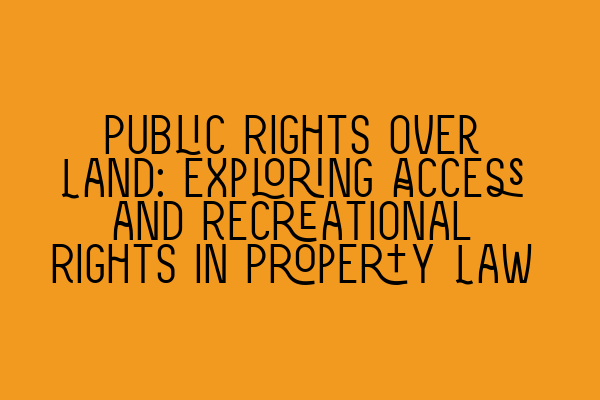Public Rights over Land: Exploring Access and Recreational Rights in Property Law
When it comes to property law, much of the focus tends to be on the rights of individual owners and the restrictions they can place on their land. However, it is equally important to consider the rights of the public when it comes to accessing and using land. In this article, we will delve into the concept of public rights over land, specifically focusing on access and recreational rights.
Access Rights: Opening the Gates to Public Land
Access to land is a fundamental right, and the law recognizes the importance of allowing the public to access certain areas for various purposes. The legal framework governing access rights in the UK is primarily based on common law and legislation, such as the Countryside and Rights of Way Act 2000.
One prominent example of access rights is the public’s right to use public footpaths and bridleways. These routes, often marked by signposts or designated paths, allow individuals to traverse privately owned land. The right to access extends not only to pedestrians but also to horse riders and cyclists in the case of bridleways.
It is worth noting that the public’s right to access land is not absolute and can be restricted or limited in certain circumstances. Landowners can impose reasonable restrictions on access, such as seasonal closures to protect wildlife or crops, as long as they do not unduly interfere with the public’s enjoyment of the right.
Recreational Rights: Unleashing the Potential of Public Land
In addition to access rights, the public also has certain recreational rights over land. These rights enable individuals to engage in recreational activities on public land, such as walking, picnicking, and birdwatching.
One notable piece of legislation that underpins recreational rights is the National Parks and Access to the Countryside Act 1949. This Act ensures that the public can enjoy outdoor spaces, including national parks, areas of outstanding natural beauty, and open countryside.
Recreational rights should not be confused with rights of ownership or exclusive use. They do not grant individuals the right to engage in activities that may cause damage to the land or interfere with the rights of others. It is vital for individuals to exercise their recreational rights responsibly and respect the environment and the rights of landowners.
Balancing Rights: Finding Common Ground
As with any legal issue, there is a delicate balance to be struck between the rights of landowners and the rights of the public. Property law aims to find a middle ground, ensuring that individual landowners’ interests are protected while also recognizing the importance of public access and recreational rights.
This delicate balance can sometimes lead to disputes, particularly in cases where landowners request restrictions or closures that significantly impact public access. Disputes can arise over the extent of access rights, the nature of recreational activities allowed, and the enforcement of restrictions. In such situations, legal guidance and intervention may be required to reach a fair resolution.
Stay Informed with SQE Property Law & Land Law
At SQE Property Law & Land Law, we strive to provide you with comprehensive and up-to-date information on property law matters. If you found this article informative, you may also be interested in our related articles:
– Updates in UK Property Laws: Key Changes and Implications
– Legal Challenges in Property Transactions: A Comprehensive Guide
– Navigating Lease Laws in the UK: Essential Guidelines for Tenants and Landlords
– Dominate Property Law Questions: Avoiding Common Pitfalls
– Land Law Revision Tips: Ace Your Exam Preparation
By staying informed, you can deepen your understanding of property law and ensure you are equipped to navigate the complexities of public rights over land. Whether you are a landowner, a recreational user, or an aspiring property law professional, our articles aim to provide valuable insights and guidance.
Remember, knowledge is power, and with SQE Property Law & Land Law, you can stay ahead in the ever-evolving world of property law.
